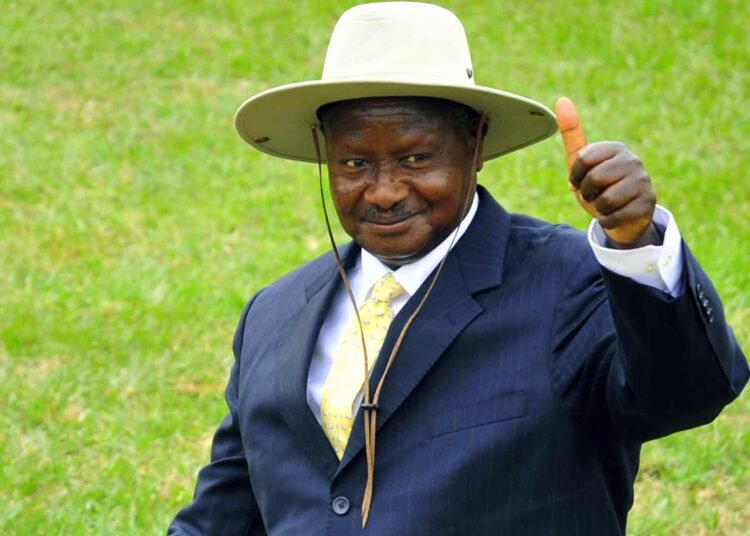The Executive Board of the International Monitory Fund (IMF) has approved a 120 million dollars (440 billion shillings) loan under its Extended Credit Facility (ECF) for Uganda.
The IMF Executive Board on Wednesday concluded the fourth review of Uganda’s ECF, And this now enables the immediate disbursement of the cash, equivalent to 90.25 Special Drawing Rights.
This brings total disbursement under the arrangement to 750 million dollars. In June 2021, the IMF board approved the ECF Arrangement for Uganda for a total of SDR 722 million or S1 billion, to support the response to the COVID-19 pandemic and boost more inclusive private sector-led long-term growth. The installment or disbursement is made after a review of the performance of the previous one and the steps the government is taking in reforming public finance management.
Reforms focus on creating fiscal space for priority social spending, preserving debt sustainability, strengthening governance and reducing corruption, and enhancing the monetary and financial sector frameworks.
Following the completion of the fourth review, the Executive Board also approved the request by Uganda for the waiver of non-observance of a performance criterion on the ceiling on net credit to the central government from the BoU.
Last year, the IMF threatened to suspend its financial cooperation with Uganda until the government reduced its debt obligation to BoU, said to amount more than 8 trillion shillings at the time.
But in a statement to the media, BoU denied that the government had failed to pay the money it owed to the Central Bank.
Other conditions by IMF touched on the reforms in public finance management including measures to curb corruption, increasing domestic revenue mobilisation, enhancing private sector growth and fiscal consolidation (reducing budget deficits and stabilising or reducing public debt), among others.
“Uganda is on a steady path to full recovery, sustained growth and reform for socio-economic transformation. Thank you my team at Finance and BOU,” said PS Finance Rmathan Ggoobi when the IMF board decison was announced.
The Board commended Uganda’s performance as well as the economic situation despite the many shocks it faced over the last year, with growth expected at 5.5 percent this financial and 6 percent next year.
“The improved near-term outlook has been revised up slightly, and inflation projections are marked down for financial year 23/24, reflecting the impact of more favorable weather conditions on domestic harvests, the softening of global commodity prices and easing of global demand-supply imbalances, and the lagged effects of monetary and fiscal policy tightening,” the IMF says.
It, however, warns that a stronger tightening of global financial conditions would constrain the availability of syndicated loans which could affect the stability of the financial sector.
This calls for sustained fiscal consolidation and tight monetary policy to help keep debt on a sustainable path, as well as maintaining the structural reforms.
“Together with these initiatives, efforts to increase social spending will also improve prospects for achieving a more inclusive, sustainable, private sector-led long-term growth.”
This anticipated growth could, however, be hampered by risks that arise from further tightening of external financial conditions, a renewed pickup in inflation which would increase borrowing costs via additional monetary tightening, and a stronger-than-expected drag of higher borrowing costs on private sector credit and investment.
The lender also cites the conflict in Sudan which could have a negative impact on exports, as well as international reactions to the recent signing into law of the ’Anti-Homosexuality Bill, 2023’ which could have “a larger-than-anticipated impact on the availability of grants and external loans from development partners, as well as Foreign Direct Investment and tourism.”
In spite of this, Kenji Okamura, Deputy Managing Director and Acting Chair remains positive on the government’s ability to maintain a positive growth path.
“The Ugandan authorities remain firmly committed to their economic program amidst a challenging environment. Most quantitative targets were met in December 2022 and March 2023,” said Okamura at the end of the review.
He also noted that the government just slightly missed the cap on its net borrowing from BOU but met all the targets by June.
“The Quantitative Performance Criterion (QPC) on the ceiling on the Bank of Uganda (BoU) net credit to government (NCG) was missed by a very small margin in March 2023. All structural benchmarks due between March and June 2023 have been met.”
The IMF urged the government through Uganda Revenue Authority to fully implement the Domestic Revenue Mobilisation Strategy, including the additional tax administrative measures identified by the authorities, to help reduce the debt-to-GDP ratio, and allow for an increase in social spending.
Other recommendations include fast-tracking the tax exemption rationalization plan to boost revenue mobilization efforts, as well as safeguard the financial sector stability through stronger supervision as the asset quality of some banks is deteriorating.
On the current monetary policy stance, Okamura commended the Central Bank for maintaining its base Rate, the CBR at a high 10 percent despite falling inflation, but said it should not hesitate to tighten further in case conditions arise.
“The current monetary policy stance is appropriate, but the BoU should stand ready to resume its tightening if signs emerge of a slower-than-expected disinflation. Exchange rate flexibility remains.”






























































